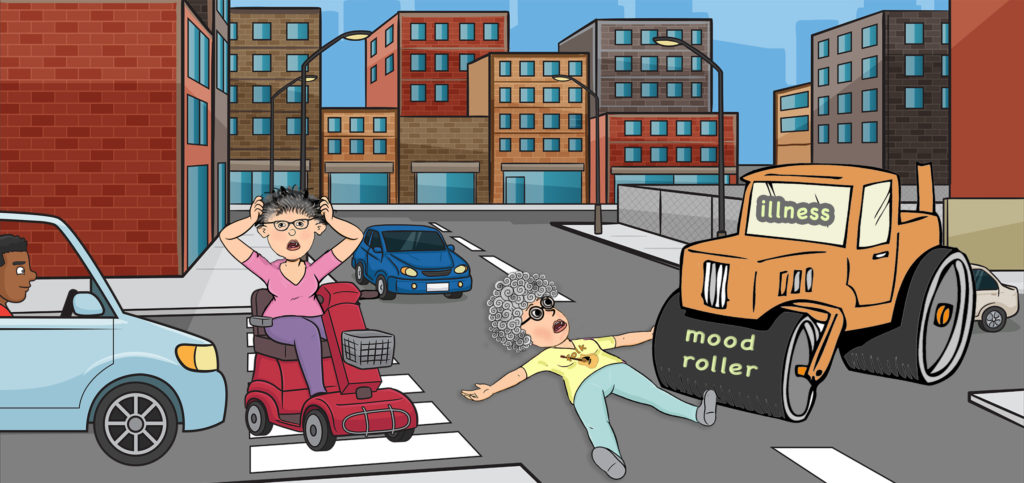Mood management is by far the most difficult aspect of living with a chronic illness. It doesn’t matter if you have a visibly obvious disability or an invisible medical condition; the ‘Mood Roller’ does not discriminate.
Like a trained dog sniffing out hidden drugs, the Mood Roller knows when your guard is down and moves in for the squash. Wham! In no time at all, you’re as flat as a pancake without the sweetness of syrup to take away the pain.
Pain and fatigue are part of a chicken-and-egg scenario – it doesn’t really matter which comes first. It’s the power of their united force that weakens your mental reserve.
Moods, like clouds in the sky, come and go. It might seem as if they appear out of nowhere, but actually, they are the link that fuses emotions and feelings together.
Emotions are the result of chemicals that get released in our brain and body in response to triggers. In less than one second we form an emotional interpretation and feedback loop.
For example, think of the sinking, and yet accelerating, feeling that races through your body when you realize you can’t locate your keys!
The emotional chemical upheaval only lasts for approximately six seconds but from there, our thinking takes over and we roll into feelings – feelings that are often fuelled by a mix of emotions and last much longer.
We think and contemplate emotions… we believe, we sense, we make meaning.
The chemical responses from the emotion are now cognitively processed, and because of that, feelings linger and form associations.
Consider the lost keys, when it happens again a similar feeling of frustration will surface. “Here we go again!”
Moods certainly gain momentum from emotions and feelings but they also differ because they are not tied to a specific incident. Instead, they are accumulative and influenced by a whole host of factors, such as the environment, your physiology, your mental state, and focus.
Moods can last several minutes, hours, and days, but when an illness is a factor they can become overwhelming.
Ok, so how can you manage your illness-impacted moods?
Well, much like an onion you need to peel back the layers.
The most important thing is to move away from your “thinking” and instead focus on making changes to mood influencers.
Changing your environment – moving to another room, heading outdoors, adjusting lighting, adding sound (music?) or phoning a friend can help shake things up.
Adapting your physiology – making a plan to rest, exercise, drink or eat something soothing will make a difference. Having a shower may also help.
Most importantly, focus on working with your thoughts; practice compassionate self-talk, and remind yourself you are not alone.
It’s hard to do but when you sense the Mood Roller is coming your way, you have to stop and go inward.
Try to become conscious of self-deprivation; your mean-making is out of whack.
Look around and see what you can change, just one thing can start a shift, and remember – only you can do it.
So, why not pick yourself up (metaphorically) and let that sucker roll right by you!











